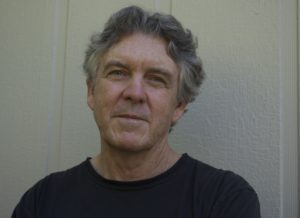The nightshift brickmakers listen to Beethoven on their lunch break—
it’s deep winter, three pallets are in, the first kiln in the row of immense kilns fully fired, the noise of the gas jets audible even outside its thick firebrick, and in the red brick lunchroom the men eat their sandwiches, Ode to Joy blasting through the speakers one of the men brought in, the Beethoven too loud to allow small talk, the bread in the sandwiches delicious, a full moon rising through trees in the long window behind them.
Winter Coat
It was only because you needed that winter coat that the cat, shut inside one of your trunks, was able to live. Of course the coat was fouled, the cat a mere suggestion of cat, your grief that he’d run away now replaced by self-loathing. But you nursed him back: day by day he gained weight, the bare patches grew fur, his own winter coat glowed, his eyes called back their old incisiveness, and soon he was able to jump from floor to window ledge again.
It was then, of course, that he left, and that you began, season after season, to walk the streets in that dry-cleaned winter coat, calling his name
Over There
Strange how, even beyond The Great War Over There has meant so many things to so many men—not exactly a euphemism, more an avoidance to name a geography where a particular subsequent slaughter occurred.
When he was Over There he woke each day & saw himself as feudal, loyal, in the employ of some dumb Lord, but now he was Back Here, and the fact that he was able to shower seemed impossibly luxurious, a gift against memories of an air that was all grit all the time, and so he rose earlier than the others, showered before the heat of the day would render its effect useless, and he’d dress—for battle? for no battle? We never know, we underlings. But my body’s ceremonially clean, well clad, flak-jacket cinched tight
He liked the word clad. That was the knight part, & if he could hold that notion quiet within him, close to bone, share it with no one Back Here—then, if something happened, he would be there for it, trained now—not a stand-in for the man who went so thoughtlessly Over There.

Gerald Fleming’s newest book is One (Hanging Loose Press, New York), prose poems in monosyllabics. Previous books are The Choreographer (prose poems, Sixteen Rivers Press, California), Night of Pure Breathing (prose poems, Hanging Loose), and Swimmer Climbing onto Shore, poetry (Sixteen Rivers). He taught in San Francisco’s public schools for thirty-seven years and has written three books for teachers, including Rain, Steam, and Speed (Jossey-Bass/Wiley). From 1995 to 2000, he edited and published the literary magazine Barnabe Mountain Review, and is currently editing both the limited-edition vitreous magazine One (More) Glass and The Collected Prose & Poetry of Lawrence Fixel. He lives most of the year in Lagunitas, California, and part of the year in Paris.





















































